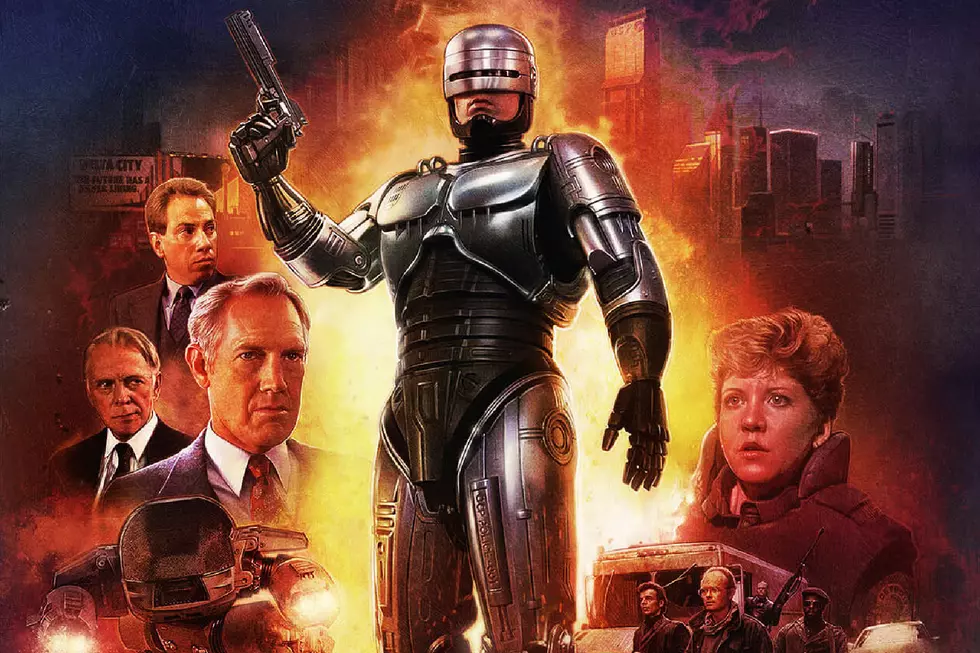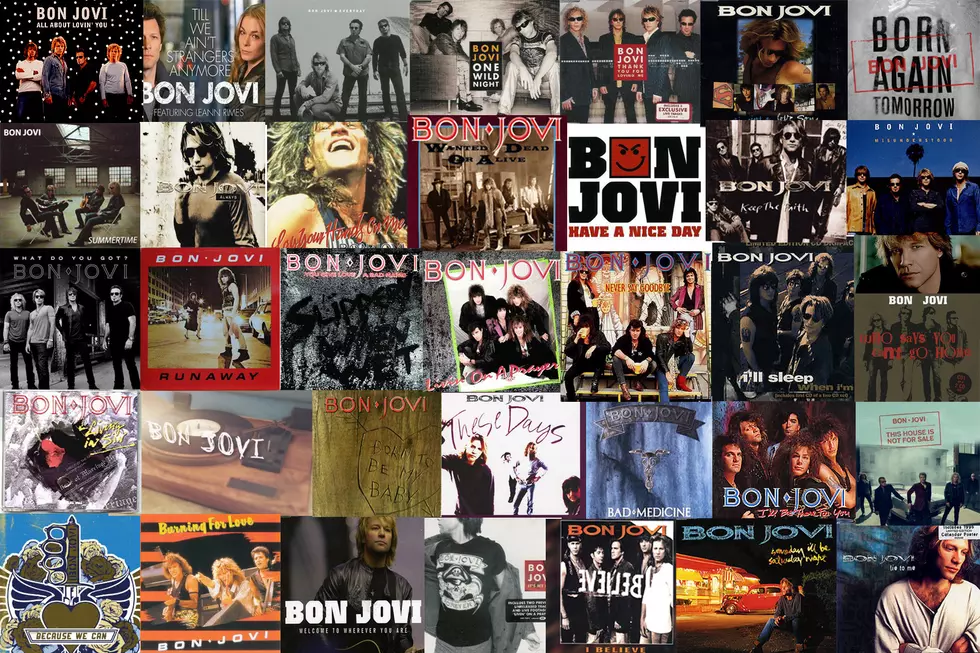
35 Years Ago: Dead or Alive, You’re Coming With RoboCop
The release of science fiction film RoboCop on July 17, 1987, was the start of a slow ascent to cult status.
It took audiences a while to understand the film's complexity – after all, the title would seem to suggest a cheap B-movie pre-feature.
Set in a near-future dystopia where the Omni Consumer Products corporation owns the entire city of Detroit, it’s the story of street cop Alex Murphy (Peter Weller), brutally murdered in the course of his duty, who’s resuscitated by the corporation and rebuilt as a cyborg officer, described as “the future of law enforcement.” Thus the name “RoboCop,” created by a marketing exec to be consumer-friendly.
But of course it’s not that simple. OCP owns the police department but also the criminal gang which runs the underworld, led by Clarence Boddicker (Kurtwood Smith), who’d killed Murphy. As parts of his memory filter through his three-directive programming, RoboCop discovers how corrupt the city is, and also that OCP installed a fourth, secret directive, which prevents him from acting against the corporation.
“They killed me on purpose and put me in this machine,” Weller explained during the shoot. “These powers that be manage the police force and are also behind the cybernetic cop idea. They are also the people who are feeding the drug wars, so they can build more robots and fight the drug wars they themselves created! All these people are guilty – not only the people who shot me, but the people who made me, too.”
Watch the Original ‘RoboCop’ Trailer
RoboCop was Dutch director Paul Verhoeven’s breakthrough movie, and his trademark character ran deeply through it. The violent scenes were so deliberately extreme that they remain many first viewers’ leading memories. Desperate studio execs insisted on cutting seconds here and there in a bid to drop the bullet count to secure an R rating. Verhoeven resisted every edit, arguing that kids would find his violent scenes comedic, especially in the context of his direction. He was right – while the shocking disintegration of Murphy by Boddicker’s gang remains in the memory, so too does the cartoon-like moment when acid-soaked gangster Antonowsky is splattered into liquid by Boddicker.
“Initially, I rejected the script because it was so different from what I’d been doing in the Netherlands,” Verhoeven told the Guardian in 2022, explaining that he struggled with the American slang language because he was so unfamiliar with it. “There were so many moments where I could’ve gone wrong. In the script, somebody would say, ‘Hey brother,’ and I would ask, ‘Who is the brother?’”
Watch the Violent Death of Alex Murphy
The context was everything. If the violent scenes were so extreme as to be funny, so too was the social commentary in the script by Edward Neumeier and Michael Miner. The dangers of neoliberalism running wild are illustrated in OCP’s ability to take over en entire city, including its police, while a hapless mayor tries to persuade an uncaring electorate to think about what’s right for the future rather than embracing tax breaks and consumer benefits. Newsreaders making free political commentary during reports, fudging the space between facts and truth for political ends, is now a world standard. While laughing, the audience are invited to consider that, if the worst of humanity is the worst of us all, how bad are we allowing ourselves to become?
The roots of that approach came from comic books – Neumeier said he’d wanted to create a character who felt like “a superhero with a headache.” In particular, 2000AD breakout strip Judge Dredd was a massive influence. An early version of the RoboCop costume even featured a helmet similar to Dredd’s, and the non-cyborg future cop (who is a clone, though) was referenced in the dialog line: “Your move, creep.”
It was key for Weller to depict the human inside RoboCop's metal casing, and to that end he spent four months working with a mime performer to develop a style of movement in his costume. “We wanted to take a human being and transform him into a robot, walking in a suit in such a way that was stylized, attractive, yet computerized… we wanted to have some humanity breathe through this robotic thing,” the actor explained.
But the costume, designed by special effects icon Rob Bottin, caused serious issues when it arrived. Weller was to start shooting the same day, but instead spent all day fighting to put it on. It took several days of adjustment before the costume worked, by which time the movie was running close to deadline. “Truthfully, it came down to a matter of will,” Weller said. “I thought, ‘Look – out of all this madness over whether the suit will fly or not, it’s going to be me in the costume. It’ll come down to me. With four months of preparation, and the wonderful wealth of talent we have available, we’re going to make it work!”
Fortunately it did work, along with a stack of stop-motion scenes by leading light Phil Tippett, whose interpretation of the ED-209 police machine added another strong element to the story. The complete opposite of the cyborg RoboCop, ED-209’s AI-animal nature shone through, its mindless malice (the killing of staff working on it) and stupidity (when it falls down the stairs) proving again that there’s a lot to be said for humanity – if it’s allowed to be said.
Watch RoboCop Fight ED-209
Underlying it all, in the end, was the concept of a dystopian Second Coming of Christ. Verhoeven wanted Murphy to suffer horribly for our sins, then return as a digital messiah, but struggle with the responsibility. “The scene where Peter’s character is executed is extremely violent – like a crucifixion,” Verhoeven said. “And what happens after is a kind of resurrection. I started to look at the movie in those terms – and I’m not a Christian. It was one of the reasons I have RoboCop walking over water when he kills Clarence Boddicker, the bad guy, at the end. I felt he was like the American Jesus – whereas Boddicker is evil personified.”
Weller cited the moment when RoboCop tells his partner that he can no longer remember his wife and son, but he can feel them, as the moment of “emotional catharsis” that defines the movie’s humanity. Verhoeven observed: “[P]eople feel the movie is not only science fiction but something with a certain warmth, too. RoboCop is a victim but he overcomes being victimized.”
With a box office of $53.4 million against a budget of $13.7 million, RoboCop was a hit that launched a franchise. Two sequels would follow, along with a 2014 reboot. Another film, RoboCop Returns, is also reportedly in production, based on a story by Neumeier and Miner which had been abandoned because the studio wanted RoboCop 2 on screen by 1990 and they didn’t have time to complete their planned script.
Watch RoboCop’s Violent Showdown With Boddicker
According to Weller, the original film's appeal came down to its very human foundation.
“It’s a tight action adventure, and very commercial, but it’s very centered,” the actor explained. “The core is discovery – the sadness that this guy’s life was taken away and he was instilled into a killing machine. But the wonderfulness is that he starts to discover what he once was, and he pursues it like a dream. In the end, to a degree, he wins it back.” He added: “Aside from the action-adventure, the corruption, corporate machinery gone berserk and so on, the heart of all this is a morality tale. It’s like Beauty and the Beast, or the Tin Man of The Wizard of Oz. It’s a great little jewel of a human story.”
Watching it again, RoboCop is more violent than one might remember, but also more hard-hitting in terms of its conscience. If the worst of humanity is the worst of us all, how much worse have we allowed ourselves to become in the past 35 years? And isn’t it time we did something about it?
The Best Rock Movie From Every Year
More From Ultimate Classic Rock









